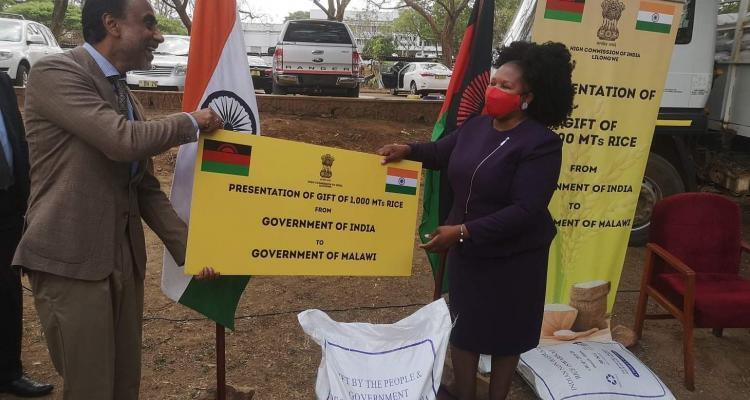
The Government of India has donated about 20,000 bags of rice (each weighing 50kg) valued at US$700,000 (about MK528 million) to assist Malawi in reaching out to over 2.6 million food-insecure people.
Speaking in Lilongwe on Monday during the official handover ceremony of the donation, Indian High Commissioner to Malawi, Anurag Bhushan said the donation signifies the goodwill and cordial relationship that exists between the two governments and hoped that it will go a long way towards supporting vulnerable households amidst the Covid-19 pandemic.
“The donation is in support of Malawi’s efforts in meeting recent food shortage which has been caused by acts of nature and aggravated by the Covid-19 pandemic,” said Bhushan, whose government donated US$ 2 million-worth medicine in July, 2020, to assist Malawi in the fight against the Covid-19 pandemic.
In her remarks, Deputy Minister of Agriculture, Agnes Nkusa Nkhoma described the donation as timely.
“The 2020 food security assessment report by the Malawi Vulnerability Assessment Committee (MVAC) has projected 2.6 million people as requiring humanitarian food assistance during the lean season from November, 2020 to March, 2021.
“Government, through the Department of Disaster Management Affairs, in collaboration with humanitarian partners, is finalizing the development of the 2020/2021 Lean Season Food Insecurity Response Plan to mobilize resources and effectively coordinate the response to the food insecure communities.
“The food shortage has been exacerbated by the impact of Covid-19 pandemic. The donation comes at the right time and it will complement government’s efforts in mobilizing resources for the implementation of the 2020/2021 Food Insecurity Response Programme that will roll out in November, 2020,” said Nkusa Nkhoma.
The Deputy Minister further said government is making efforts to graduate from chronic food insecurity by stepping up interventions that will contribute to resilience building of the affected communities to break the food insecurity vicious cycle.
“To this extent, government, together with its partners is implementing the National Resilience Strategy which is meant to reduce the vulnerability of communities to different shocks including floods and prolonged dry spells which lead to food insecurity,” said Nkusa Nkhoma.














